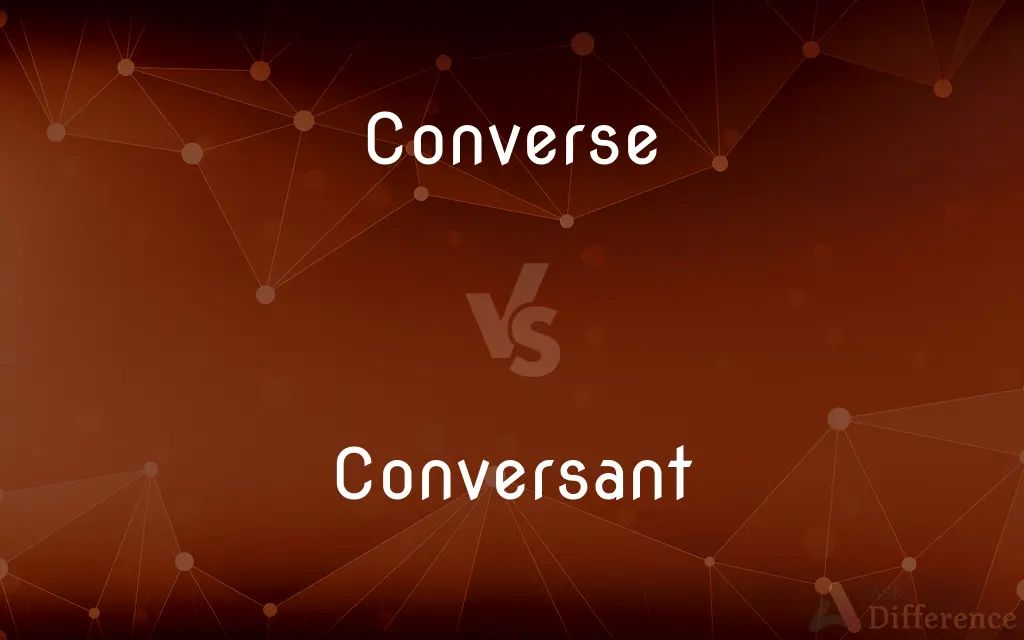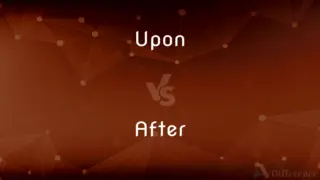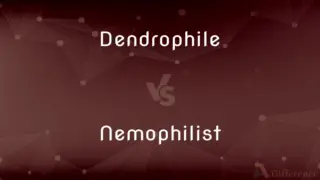Converse vs. Conversant — What's the Difference?

Difference Between Converse and Conversant
ADVERTISEMENT
Compare with Definitions
Converse
To engage in an exchange of thoughts and feelings by means of speech or sign language.
Conversant
Familiar or knowledgeable, as by study or experience
Conversant with medieval history.
Converse
(Archaic) To interact socially with others; associate.
Conversant
Closely familiar; current; having frequent interaction.
Converse
An interchange of thoughts and feelings by means of speech or sign language; conversation.
ADVERTISEMENT
Conversant
Familiar or acquainted by use or study; well-informed; versed.
She is equally conversant with Shakespeare and the laws of physics.
Converse
Social interaction.
Conversant
(obsolete) Concerned; occupied.
Converse
Something that has been reversed; an opposite.
Conversant
One who converses with another.
Converse
(Logic) A proposition obtained by conversion.
Conversant
Having frequent or customary intercourse; familiary associated; intimately acquainted.
I have been conversant with the first persons of the age.
Converse
Reversed, as in position, order, or action; contrary.
Conversant
Familiar or acquainted by use or study; well-informed; versed; - generally used with with, sometimes with in.
Deeply conversant in the Platonic philosophy.
He uses the different dialects as one who had been conversant with them all.
Conversant only with the ways of men.
Converse
To talk; to engage in conversation.
Conversant
Concerned; occupied.
Education . . . is conversant about children.
Converse
(followed by with) To keep company; to hold intimate intercourse; to commune.
Conversant
One who converses with another; a convenser.
Converse
(obsolete) To have knowledge of (a thing), from long intercourse or study.
Conversant
(usually followed by `with') well informed about or knowing thoroughly;
Conversant with business trends
Familiar with the complex machinery
He was familiar with those roads
Converse
Free verbal interchange of thoughts or views; conversation; chat.
Converse
The opposite or reverse.
Converse
(logic) Of a proposition or theorem of the form: given that "If A is true, then B is true", then "If B is true, then A is true.".
All trees are plants, but the converse, that all plants are trees, is not true.
Converse
(semantics) One of a pair of terms that name or describe a relationship from opposite perspectives; converse antonym; relational antonym.
Converse
Opposite; reversed in order or relation; reciprocal
A converse proposition
Converse
To keep company; to hold intimate intercourse; to commune; - followed by with.
To seek the distant hills, and there converseWith nature.
Conversing with the world, we use the world's fashions.
But to converse with heaven -This is not easy.
Converse
To engage in familiar colloquy; to interchange thoughts and opinions in a free, informal manner; to chat; - followed by with before a person; by on, about, concerning, etc., before a thing.
CompanionsThat do converse and waste the time together.
We had conversed so often on that subject.
Converse
To have knowledge of, from long intercourse or study; - said of things.
According as the objects they converse with afford greater or less variety.
Converse
Frequent intercourse; familiar communion; intimate association.
"T is but to holdConverse with Nature's charms, and view her stores unrolled.
Converse
Familiar discourse; free interchange of thoughts or views; conversation; chat.
Formed by thy converse happily to steerFrom grave to gay, from lively to severe.
Converse
A proposition which arises from interchanging the terms of another, as by putting the predicate for the subject, and the subject for the predicate; as, no virtue is vice, no vice is virtue.
Converse
A proposition in which, after a conclusion from something supposed has been drawn, the order is inverted, making the conclusion the supposition or premises, what was first supposed becoming now the conclusion or inference. Thus, if two sides of a sides of a triangle are equal, the angles opposite the sides are equal; and the converse is true, i.e., if these angles are equal, the two sides are equal.
Converse
Turned about; reversed in order or relation; reciprocal; as, a converse proposition.
Converse
A proposition obtained by conversion
Converse
Carry on a conversation
Converse
Of words so related that one reverses the relation denoted by the other;
`parental' and `filial' are converse terms
Converse
Turned about in order or relation;
Transposed letters
Share Your Discovery

Previous Comparison
Upon vs. After
Next Comparison
Dendrophile vs. Nemophilist













































